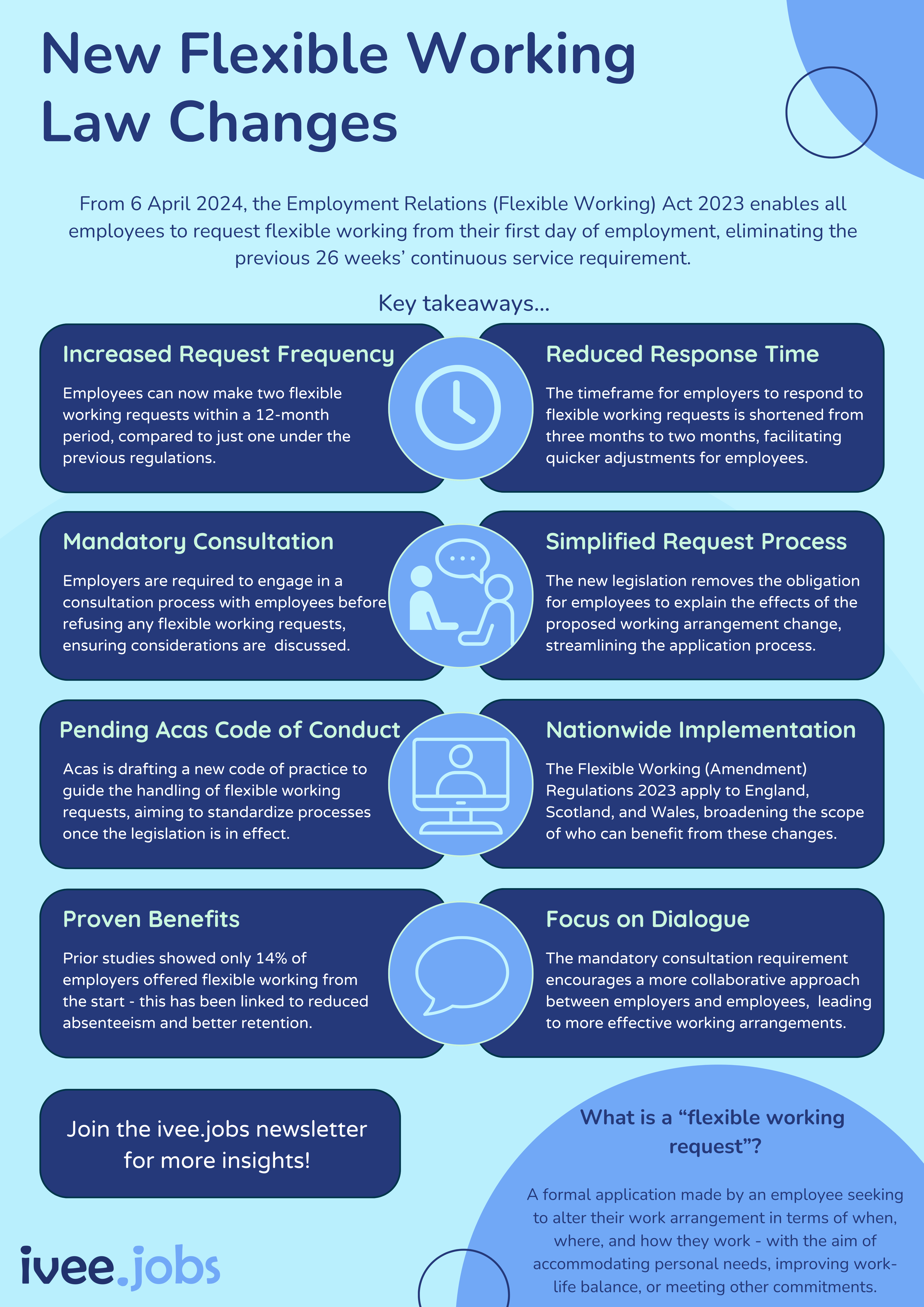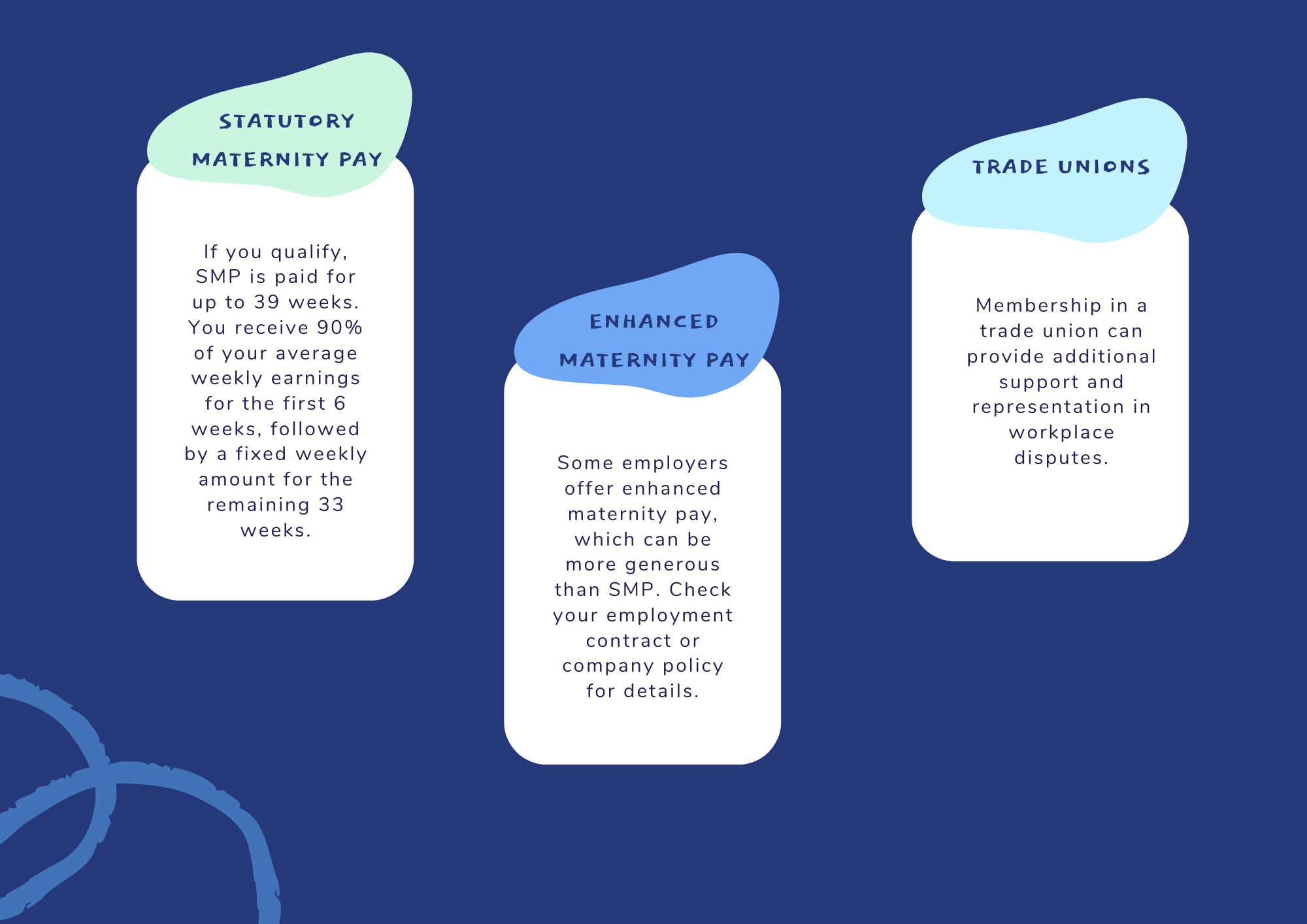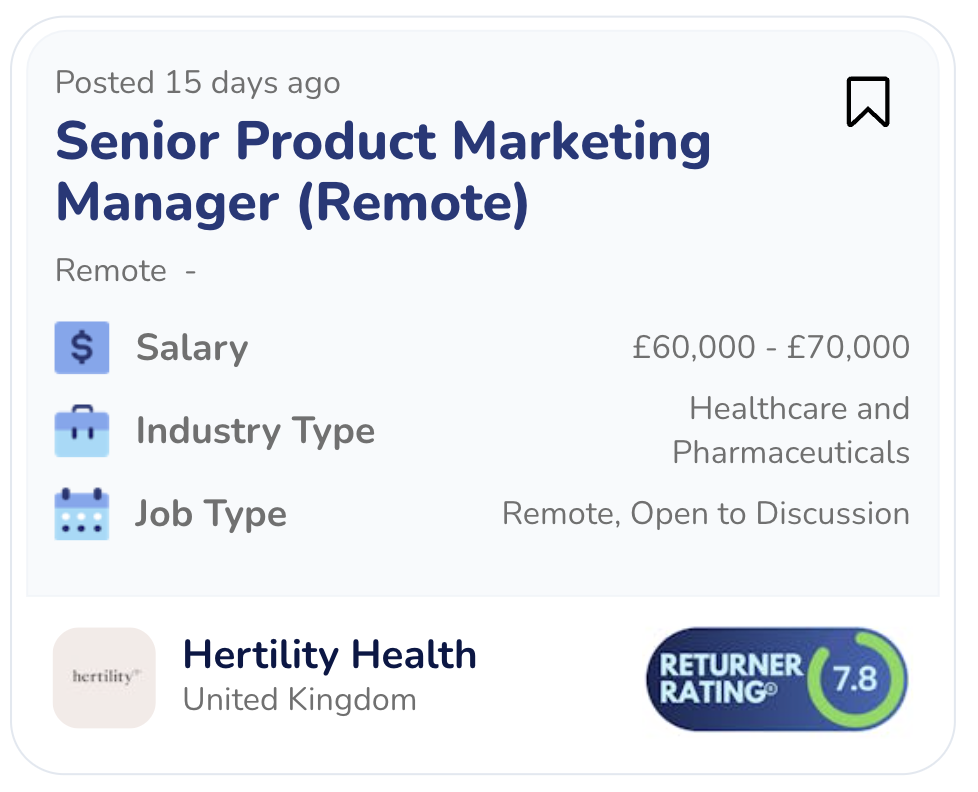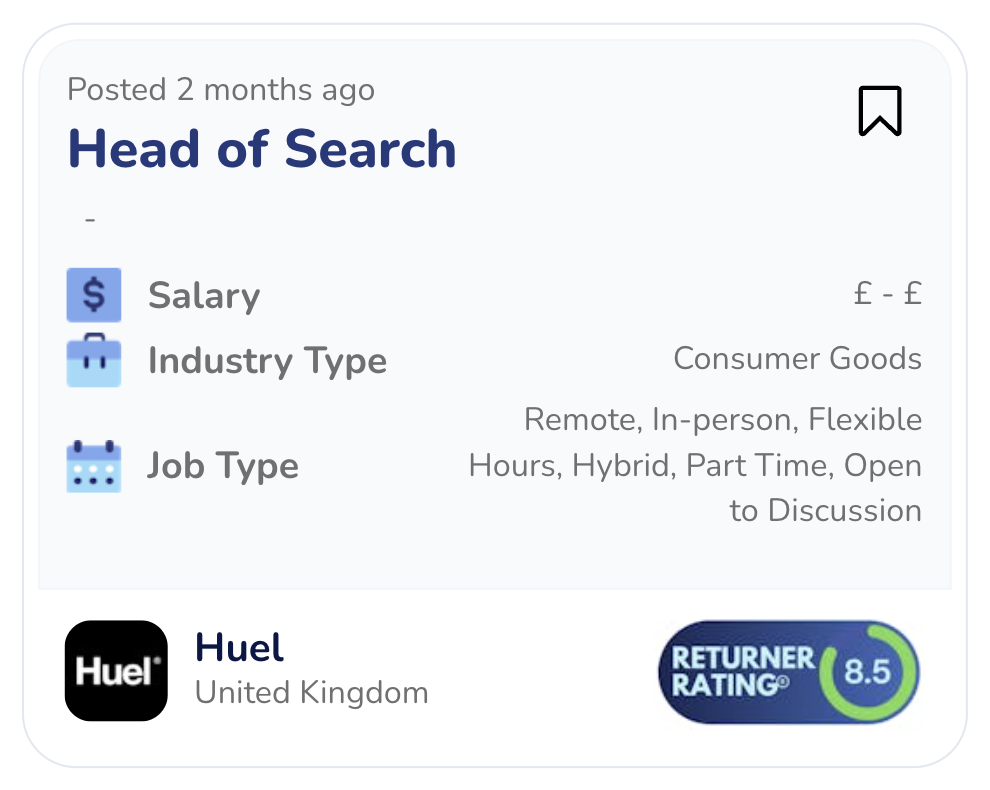Returning to work from maternity leave can be a complex and emotional process. Balancing new responsibilities as a mum with professional duties requires careful planning and understanding of your rights and options.
This comprehensive guide covers everything you need to know about returning to work after maternity leave, including your rights, employer obligations, practical tips for easing back into your role, and templates for communication with your employer. Returning to work after maternity leave can be daunting. This guide, based on UK employment laws and expert insights from HR professionals, will help you navigate the transition with confidence. For legal rights, we reference official sources such as GOV.UK and Acas.
Jump to:
- Your rights on maternity leave
- Statutory vs. employer policies: understanding your options
- Employer obligations
- Making a flexible working request
- Practical tips for returning to work after maternity leave
- Communication templates when returning to work after maternity
- Addressing changes at work
- Returning to work early after maternity leave
- Balancing work and parenthood
- How ivee supports your job search after maternity leave
- Maternity pay and benefits
- Legal rights and support
- Return to work interview after maternity
- Deciding not to return to work after maternity leave
- FAQs: Returning to work after Maternity Leave
- Conclusion
Your rights when on maternity leave
Navigating maternity leave can be a challenging process, but understanding your rights can make it much easier. Whether you’re about to embark on Ordinary Maternity Leave (OML) or Additional Maternity Leave (AML), it’s crucial to know what to expect when it comes to job security, protection from unfair treatment, and your entitlements regarding pay and benefits.
Right to return to the same job
Under UK law, employees who take Ordinary Maternity Leave (up to 26 weeks) have the right to return to the same job. If taking Additional Maternity Leave (more than 26 weeks), you should be offered a similar role if your original job is no longer available. For detailed information, refer to the UK government’s guidance on maternity leave rights. (GOV.UK)
Ordinary Maternity Leave (OML): If you take up to 26 weeks of maternity leave, you have the right to return to the same job you had before you left. The job should be identical in terms of duties, seniority, hours, and location.
Additional Maternity Leave (AML): If you take more than 26 weeks (up to a maximum of 52 weeks), you also have the right to return to the same job. However, if it’s not reasonably practicable for your employer to offer you the same job (perhaps due to restructuring or other significant changes), you are entitled to a suitable alternative job. This alternative must be on terms and conditions no less favourable than your original job, including pay, benefits, status, and location.
01
Protection from detriment or dismissal
Unfair treatment: It is illegal for your employer to treat you unfairly or dismiss you because you took maternity leave. This includes any negative changes in your job role, reduction in pay, demotion, or exclusion from important meetings and decisions.
Compensation: If you experience any unfair treatment or dismissal, you might be entitled to compensation. You can file a complaint with an employment tribunal if necessary. Ensure you keep detailed records of any unfair treatment to support your case.
02
Pay and benefits
Continuity of employment terms: During your maternity leave, you are entitled to continue benefiting from all the terms and conditions of employment except salary. This includes accruing annual leave, receiving bonuses, and maintaining pension contributions. You are entitled to receive Statutory Maternity Pay (SMP) for up to 39 weeks, provided you meet the eligibility criteria. For comprehensive details on SMP, including eligibility and rates, consult the official UK government resource.
Annual leave: You continue to accrue annual leave during your maternity leave, which you can take either before or after your leave period. Employers may also allow you to carry it over to the next leave year.
Bonuses and benefits: Any bonuses that you would have received if you were not on leave should still be awarded unless the bonus is specifically tied to work done during the leave period. Other benefits such as health insurance, company car, or mobile phone should continue unless explicitly stated otherwise in your contract.
03
Flexible working requests
Right to request: You have the statutory right to request flexible working conditions which is protected under the 1996 Employment Rights Act, which could include part-time hours, job sharing, compressed hours, or remote working. You can make one request per year, and your employer must consider it reasonably.
Process: Submit a formal written request to your employer outlining the flexible working arrangements you are seeking and how you believe these can be accommodated without negatively impacting the business.
Employer’s response: Your employer must respond to your request within three months. They can only refuse a request for flexible working if they have a good business reason, such as additional costs, inability to meet customer demand, or issues with reorganising work among existing staff.
Appeal: If your request is refused, you have the right to appeal the decision. You may also seek advice from Acas or a legal advisor to explore further options if you believe the refusal was unfair.
04
Statutory vs. employer policies: understanding your options
When planning your return to work after maternity leave, It’s essential to understand the difference between statutory maternity rights and additional benefits your employer may offer. Statutory rights are the minimum legal entitlements provided by law, while employers may offer enhanced benefits. For a clear overview of statutory maternity pay and leave, refer to the UK government’s official guidance.
Statutory Maternity Leave rights (legally binding)
Under UK law, all employees are entitled to:
- Up to 52 weeks of maternity leave (26 weeks of Ordinary Maternity Leave + 26 weeks of Additional Maternity Leave).
- Statutory Maternity Pay (SMP) for up to 39 weeks, if eligible.
- The right to return to the same job if on leave for 26 weeks or less or a similar job if on leave for more than 26 weeks.
- Protection against unfair dismissal or discrimination related to maternity leave.
Legal reference: You can check the full details of maternity rights on GOV.UK.
Employer policies: What extra support might be available?
Beyond legal requirements, many employers offer additional benefits to support returning parents. These might include:
- Enhanced Maternity Pay – Some companies pay more than the statutory minimum, such as full pay for the first 6 months.
- Phased return to work – Employers may allow a gradual return (e.g., part-time for the first few months).
- Extended paid leave – Some organisations provide extra paid time off beyond the statutory allowance.
- Flexible working arrangements – Policies may include remote work, compressed hours, or job-sharing to help balance work and childcare.
Real-Life example: Aviva’s Enhanced Parental Leave policy
Aviva, a UK insurance company, offers equal parental leave, giving all employees six months of fully paid leave regardless of gender. They also allow a phased return to work, helping parents transition back smoothly. This progressive approach supports work-life balance and retains top talent. (Source: Aviva)
How to check your employer’s policy
Every company has different policies, so review your employment contract or speak to HR to understand what additional support is available to you. If your employer doesn’t have a clear policy, you can request flexible working arrangements under UK law once you’ve worked there for at least 26 weeks.
When discussing return-to-work options, emphasise how flexibility can benefit both you and the company, such as maintaining productivity while ensuring a smooth transition.

Did you know that new flexible working laws came into effect this year?
Ready to return to work?
Join our Return-to-Work Bootcamp and get a personal CV review and more!
Learn more!Employer obligations
Communication during maternity leave
Employers should maintain reasonable contact during your maternity leave to keep you informed of any changes at work and important updates. This is often done through “keeping in touch” (KIT) days, which allow you to work for up to 10 days during your leave without ending your maternity leave or affecting your pay.
Return-to-work plan
Employers are encouraged to support a smooth transition back to work by offering a phased return if requested. This can help you gradually readjust to your work routine.
Real-life case study: Sarah, a marketing executive, negotiated a hybrid work model post-maternity by demonstrating how remote work could maintain productivity. Her employer agreed, setting a precedent for future parents.
Making a flexible working request
If you’re considering flexible working arrangements upon returning from maternity leave, you have the right to request them. To make a statutory request, you must:
- Put the request in writing, stating it’s a statutory request.
- Detail the change you’re seeking and when you’d like it to commence.
- Explain how you believe the change will affect the business and how any potential issues might be addressed. For a comprehensive guide on making a flexible working request, including a template letter, visit Acas’s official page.
Return-to-work plan
Employers are encouraged to support a smooth transition back to work by offering a phased return if requested. This can help you gradually readjust to your work routine.
Real-life case study: Sarah, a marketing executive, negotiated a hybrid work model post-maternity by demonstrating how remote work could maintain productivity. Her employer agreed, setting a precedent for future parents.
Sample email template for flexible work request:
Subject: Request for Phased Return to Work
Dear [Manager’s Name],
I hope you’re doing well.
As I prepare to return to work on [date], I’d like to discuss a phased return or flexible work arrangement to ensure a smooth transition. Based on company policy and my role’s requirements, I propose [details of the request]. I’d appreciate the opportunity to discuss this in our next meeting.
Best, [Your Name]
Practical tips for returning to work after maternity
Planning ahead
- Discussing your return: Arrange a meeting with your employer a few weeks before your planned return date to discuss your return-to-work plan, any changes in your job role, and your working hours.
- Childcare arrangements: Ensure you have reliable childcare in place. It’s also helpful to have a backup plan for emergencies.
Phased return
- Negotiate: If possible, negotiate a phased return to work. This can help ease the transition by starting with part-time hours or flexible working arrangements.
On your first day back
- Arrive early: Give yourself extra time on your first day back to settle in and catch up with colleagues.
- Reconnect: Spend some time catching up with your team and getting up to speed with any changes that occurred during your absence.
- Be kind to yourself: Accept that it might take a little time to get back into the swing of things. Set realistic expectations and don’t hesitate to ask for help if needed.
Communication templates when returning to work after maternity
Return-to-work email to colleagues
Returning to work after maternity leave is an exciting yet transitional time. Crafting a warm and enthusiastic email to your colleagues can help ease the process and reintegrate you into the team seamlessly.
Return-to-work email to clients
Re-establishing contact with clients after maternity leave is crucial for maintaining strong professional relationships. A well-structured email ensures that clients are informed and reassured about your return and ongoing support.
Return-to-work letter
Writing a formal letter to your employer about your return to work post-maternity leave is essential for clear communication and planning. This letter confirms your return date and opens the discussion for any necessary adjustments or flexible working arrangements.
Addressing changes at work
If you find that your job has significantly changed or is no longer available, you have rights and options to consider.
- Discuss the changes: Have an open discussion with your employer to understand the reasons behind the changes and how they might affect your role.
- Seek alternative roles: If your original job is no longer available, your employer should offer you a suitable alternative role.
- Legal advice: If you feel that the changes are unfair or discriminatory, seek advice from a legal professional or a trade union representative.
Your legal rights to keeping your job:
Legal protections: Maternity leave provides you with certain legal protections. Under the Maternity and Parental Leave Regulations, you are entitled to return to the same job after Ordinary Maternity Leave (up to 26 weeks). If you take Additional Maternity Leave (more than 26 weeks), you should return to the same job unless it is not reasonably practicable. If it’s not practicable, you must be offered a suitable alternative role.
Redundancy situations: If redundancies are occurring, you are entitled to be considered for any suitable alternative roles ahead of other employees. This protection is designed to help prevent unfair dismissal due to maternity leave.
Protection against discrimination: It is unlawful for an employer to dismiss you or treat you unfavorably because you took maternity leave. If you suspect that your job loss or significant role changes are discriminatory, you can file a claim with an employment tribunal.
Legal advice: If you feel that the changes are unfair or discriminatory, seek advice from a legal professional or a trade union representative. They can provide guidance on your rights and help you navigate the process of addressing any grievances or disputes. Resources like the Citizens Advice Bureau or ACAS (Advisory, Conciliation and Arbitration Service) can also offer valuable support.
Ready to return to work?
Join our Return-to-Work Bootcamp and get a personal CV review and more!
Learn more!Returning to work early after maternity leave
Some parents may choose to return to work earlier than planned for various reasons. If you decide to return early, you must give your employer at least eight weeks’ notice of your new return date. This allows your employer to make necessary adjustments and ensures a smooth transition back to work.
I am text block. Click edit button to change this text. Lorem ipsum dolor sit amet, consectetur adipiscing elit. Ut elit tellus, luctus nec ullamcorper mattis, pulvinar dapibus leo.
Balancing work and parenthood
Returning to work from maternity leave can be challenging, but with the right support and planning, you can find a balance that works for you and your family.
Establish a routine
- Consistent schedule: Create a consistent daily schedule for you and your baby to help manage your time effectively.
- Prioritise tasks: Focus on high-priority tasks at work and home. Use tools like to-do lists and planners to stay organised.
- Self-care: Ensure you make time for self-care to maintain your physical and mental well-being.
Flexible working
Flexible working arrangements can greatly benefit parents returning to work. Employers are increasingly offering flexible work options like remote work, job-sharing, compressed hours. Consider requesting options such as:
- Remote work: Working from home can save commuting time and allow you to be more present for your child.
- Part-time hours: Reducing your hours can help you balance work and family commitments more effectively.
- Flexible hours: Having the flexibility to start and finish work at different times can help accommodate your childcare needs.
Not sure how to communicate your return after maternity leave? We’ve got the PERFECT template for you:
How ivee supports your job search after maternity leave
At ivee, we specialise in helping individuals find roles that are friendly for those returning to work from maternity leave. We understand the unique challenges that come with re-entering the workforce after becoming a mum, and we carefully vet job opportunities to ensure they offer the flexibility, support, and understanding that returners need.
Whether you’re looking for remote work, part-time positions, or roles within mission-driven companies, ivee provides a curated list of job opportunities that align with your needs and values. Our platform connects you with employers who have robust sick leave policies and a commitment to fostering a supportive work environment, ensuring a smoother and more confident transition back to work.
Here are our top job picks for women returning to work from maternity leave:
Maternity pay and benefits
Understanding your maternity pay and benefits is crucial for planning your return to work.

Join our community to stay in the loop about regulations relating to maternity leave
Legal rights and support
Acas (Advisory, Conciliation and Arbitration Service)
Provides free and impartial information and advice to employers and employees on workplace relations and employment law.
Employment tribunal
If necessary, you can take legal action against your employer through an employment tribunal.
Trade unions
Membership in a trade union can provide additional support and representation in workplace disputes.
Join the ivee community!
Join our Facebook group. Whether you’re looking to reconnect with like-minded returners, seek advice on returning to work after maternity leave, or share your experiences, our Facebook community is here to help you navigate your journey back into the workforce.
You’ll find:
👉 Latest regulatory changes regarding maternity leave
👉 CV templates for women returning to work
👉 Latest industry updates
👉 Resources and guides to help you on your job hunt
👉 Confidence-building events, webinars and advice on all aspects of returning to work
Our Facebook community
Ready to return to work?
Join our Return-to-Work Bootcamp and get a personal CV review and more!
Learn more!Return to work interview after maternity leave
What is a return to work interview after maternity leave?
Following a period of Maternity, Adoption or Shared Parental Leave it is important to ensure that the employee is supported back into work.
The purpose of this interview is to facilitate a smooth transition back into the workplace, address any concerns, and discuss any adjustments or support that might be needed. It is the time for you to bring up any adjustments that may help you with flexibility or minimise stress. It’s an opportunity for both parties to ensure that the employee is ready to resume their duties and to identify any potential issues that might affect their performance or well-being.
Am I required to have a return to work interview?
While return to work interviews are not legally required in the UK, many employers use them as a best practice to support employees returning to work from maternity leave and to comply with health and safety regulations. Some companies have formal policies that mandate these interviews, while others may conduct them on a case-by-case basis, depending on the nature and length of the absence.
How to prepare for a return to work interview after maternity leave
Preparation is key to making the most of a return to work interview. Here are some tips to help you get ready:
- Review your maternity leave records: Gather any documents related to your maternity leave, including dates and any communication with your employer about your leave.
- Reflect on your new routine and needs: Consider how your new responsibilities as a mother might affect your work schedule. Be ready to discuss these openly with your employer.
- Think about work-life balance adjustments: Identify any adjustments or accommodations that might help you ease back into work. This could include flexible hours, remote work options, or changes to your workload.
- Prepare questions: Think about any questions you might have regarding your return to work, company policies on work-life balance, childcare support, or available resources.
Download our potential maternity leave interview questions below:
Deciding not to return to work after maternity leave
If you decide not to return to work following your maternity leave, here are some steps to take:
- Inform your employer: Provide your employer with a formal resignation letter, giving the required notice period as specified in your employment contract.
- Return company property: Ensure you return any company property, such as laptops or mobile phones, before your last working day.
- Understand your rights: Be aware that if you received enhanced maternity pay (above the statutory amount), your employer may require you to repay some of the additional pay if you do not return to work.

FAQs: Returning to work after Maternity Leave
Conclusion

Returning to work after maternity leave involves careful planning and open communication with your employer. Understanding your rights and the support available to you can make the transition smoother and more manageable. Whether you’re returning to the same role, exploring flexible working options, or navigating changes at work, being informed and prepared is key to a successful return to work from your maternity leave.
At ivee, we are committed to supporting you every step of the way as you navigate this important transition. By planning ahead, staying organised, and leveraging available support (including programmes and templates), you can balance your career aspirations with your new role as a parent, ensuring a fulfilling and successful return to work.
Ready to return to work?
Create an ivee profile and start browsing our flexible jobs today!
Create profile!Featured Blog Posts










